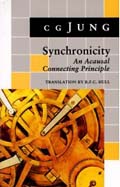The term synchronicity is coined by Jung to express a concept that belongs to him. It is about acausal connection of two or more psycho-physic phenomena. This concept was inspired to him by a patient's
case that was in situation of impasse in treatment. Her exaggerate rationalism (animus inflation) was holding her back from assimilating unconscious materials. One night, the patient dreamt a golden scarab -
cetonia aurata. The
next day, during the psychotherapy session, a real insect this time,
hit against the Jung's cabinet window. Jung
caught it and discovered surprisingly that
it was a golden scarab; a very rare presence for that climate.
But this coincidence is not senseless, a simple coincidence. By using the amplification method,
Jung associates in connection with the scarab and comes to the concept
of death and rebirth from the esoteric philosophy of antiquity, a
process that, in a symbolic way, the patient
should experience for a renewal and vitalization of her unilateral
personality, the cause of the neurosis she was suffering from.
Thus, a
significant coincidence of physical and psychological phenomena that are acausal connected.
Jung writes a book on synchronicity together
with Nobel laureate W. Pauli, a book we invite you to read (learn
more).
Synchronicity, as an explicative theory, applies to
phenomena from the area of parapsychology, prevision and premonition, to I Ching (specific method of consulting the Oracle of Changes), to astrology and many other borderline fields.
It is also present in psychotherapy,
as we have already shown. Several psychoanalysts noted certain strange
coincidences in which their patients received
information about them by extra-sensorial
ways, information that was not accessible to the general public.
|
sábado, 25 de febrero de 2012
What is Synchronicity?
Suscribirse a:
Comentarios (Atom)

